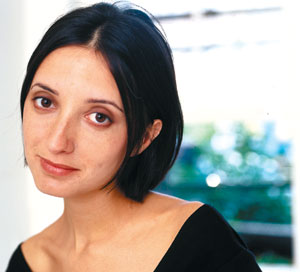A SPOONFUL OF SUGAR..
By Reed Martin
MANY STRUGGLING filmmakers can’t afford health insurance, but after a few weeks in the AVID bay, they could all use a trip to the doctor.
Documentary filmmaker and editor Fernanda Rossi, known as the “Docu Doctor,” is one New York-based practitioner who specializes in clearing up blocked and congested creativity. “Filmmakers come to me at all stages:,” says Rossi, a poteña who has a Masters degree in film production from the University of Buenos Aires. “They have an idea, and they don’t know how to develop it; they’ve shot 10 hours, and they don’t know how to go on; they’ve shot everything, and they don’t know how to organize their post-production; or they have a first cut, and it just doesn’t work.”
Explaining her diagnostic methods, Rossi continues, “I tell them to look at their own motivation rather than their subjects’ wants or needs. I ask them ‘What made you want to make this film? What interests you the most?’ That will tell you where your own heart and soul is and that’s where your story resides as well.”
Most recently Rossi has worked as a consultant on Jonathan Skurnik and Kathy Leichter’s A Day’s Work, A Day’s Pay and Hoop Dreams producer Frederick Marx’s Boys To Men. In April she’ll be giving one of her well-attended workshops in Los Angeles, sponsored by the International Documentary Association. Attendees and clients are not only fellow documentary filmmakers but also narrative filmmakers who have reached an impasse in the assembly process.
“Creative blocks are the main problem I encounter,” she notes. “We know very little about the creative process, and no university pays much attention to teaching people how to recognize their own creativity issues. We get stuck over and over because we don’t know what to look for.”
The second most common problem Rossi encounters is a stalled second act. “It’s easy to start a story and easy to end it, but it’s very difficult to come up with what happens in between,” she says. “I help filmmakers organize their structure and character dynamics to move the story forward. It’s all about creating the right environment to generate that ‘a-ha!’ experience.”
Yet, the third most common malady Rossi sees is something most filmmakers don’t even know they have: obsessive compulsive disorder. “A lot of them want to just keep re-writing or re-editing a project forever and ever,” she says. “It’s actually another form of creative block, but since it’s disguised as work, filmmakers don’t recognize it as a problem.”
To make this latter diagnosis, Rossi reads the script and watches the rough cut (if one exists), but more importantly she spends time with the filmmaker to get a sense of his or her own psychology. “I ask certain questions to try to figure out where they get fixated,” she says. “My job is to find out if they are making superficial changes or real progress. Very often people keep going simply because they cannot detach themselves from the project.”
The difference between an editing consultant and Rossi’s doctoring is this level of psychological analysis, she says. “I don’t look for a solution to their narrative problem among the hours and hours of footage — I’m looking for the origin of the block that is preventing a filmmaker from seeing the best solution.
“Usually I see the solution to their narrative problem immediately, but I don’t point it out because then it would be my solution. I would rather have them experience an organic creative process that leads to discovery than simply follow a recipe.”
Rossi’s medicine kit, which she uses in her seminars and in one-on-one consultations, includes storyboards, notecards, music, and a log-line writing exercise to help filmmakers navigate the maze that leads to that elusive final edit. “‘There was a painter who once said, ‘A painting never ends, it just stops at an interesting point,’” she reflects. “What I do is help people recognize whether or not they have fulfilled the premise they started with and enunciated the message they wanted to express. When a filmmaker is fixated on frame-to-frame changes or a writer is bent on changing individual words here and there, that is a sign that it’s time to wrap things up.”
Contact docudoctor@yahoo.com or visit www.documentarydoctor.com.
VOD CALENDAR


 See the VOD Calendar →
See the VOD Calendar →



